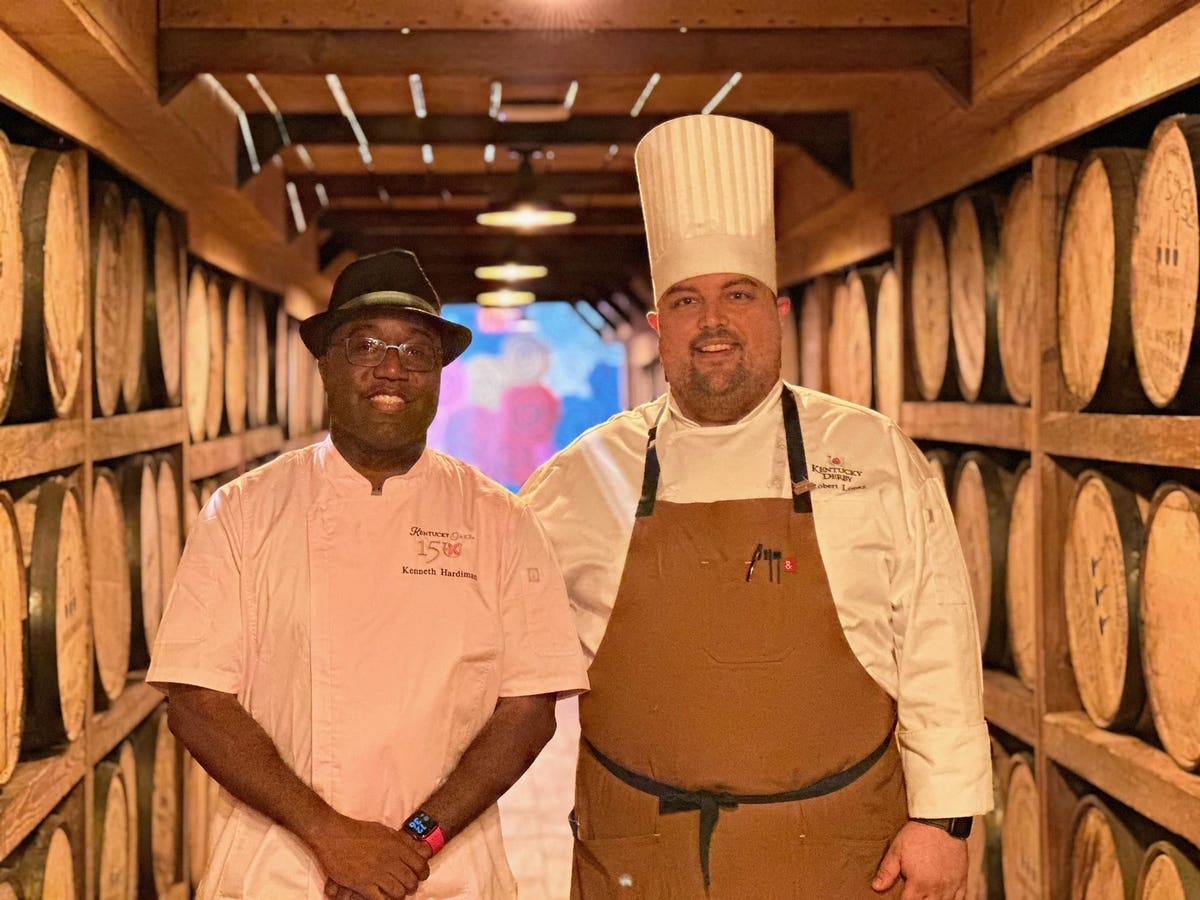The sheer volume of operations at the Kentucky Derby is staggering. With 150,000 fans on Derby day alone, the effort to feed—and hydrate with the ever-popular mint julep—requires yearlong planning and precise execution from concessionaire Levy.
“This is a monster,” Andy Lansing, Levy CEO, tells me. “And I say that in all the great ways. It might be the hardest degree of difficulty in what we do.”
Levy, known for hosting food and beverage at some of the country’s grandest events, from the Emmy Awards and the Grammy Awards to Super Bowls, NCAA championships and the two-week U.S. Open, doesn’t experience a crush quite like the Kentucky Derby.
“The scale of people at an event like this is enormous,” Lansing says. “It is crazy when you think about the scale of what we bring in as a resource just in terms of people. It is pretty awe-inspiring.”
Feeding fans at the Kentucky Derby is about more than the 150th running of the race on May 4. It started on Monday, with events all week, culminating in the final day. Levy has 5,000 staff on site making it run, including bringing in about 300 chefs and support personnel from other locations around the country. “You have to bring together that perfect blend of muscle and finesse,” Lansing says. “You have to have the finesse of a restaurateur, your food has to be restaurant quality, but at the same time you have to have the muscle to serve hundreds of thousands of people.”
Making the task more complicated is the logistical puzzle. Churchill Downs is also one of the most premium-heavy sporting events on the annual calendar. Across the 150,000 fans, 90,000 will land in a premium area or reserved seat, while 60,000 enter as general admission. With 40 different premium spaces broken into three tiers—premium club and private spaces, high-end premium and the top level, dubbed ultra-luxury—each of the tiers has different spaces within them. With most Kentucky Derby tickets now fully inclusive of food, Lansing says the menus must reflect the spaces and meet the demands of the customers.
To help minimize the sheer volume of people, Levy has hundreds of chefs, each assigned to specific areas with a distinct flare and flavor to compartmentalize the process. Lansing says seeing the array of ways fans experience the event is one of the beauties of the day.
Delivering on the menu requires approaching dishes that can be done at scale. Lansing says they aren’t going to do basked Alaskan tableside in a setting like the Derby, but that doesn’t mean they can’t serve a Wagyu prime rib in one club, a Berry Farms Dry-Aged Beef Porterhouse in another club and even a Wagyu Hot Dog in Matt Winn’s Steakhouse. “We don’t get scared about the size,” he says, “we are smart about what we can and can’t do.”
Those menus take on their own style. Lansing says the goal is to always bring the local feel of Kentucky to the menu that gets finalized three months prior to the race, as seen in the 10,000 pounds of smoked brisket and 9,000 pounds of shrimp. In the Woodford Reserve Paddock Club, one of the most ultra-premium on the grounds, expect to see everything from lobster and seafood burgoo to cedar-planked roasted branzino. For dessert, expect a millionaire Belgian liege waffle and ice cream sandwich bar. Across the other clubs, the range continues, with live oyster shucking, wagyu prime rib, bourbon cherry brisket burnt ends, mushroom gruyere and spinach stuffed pork and charcuterie boards with a wealth of variety and intrigue, just as a sampling.
But everywhere you go, you’ll find the mint julep. Arguably the most iconic drink at any sporting venue in the world, Lansing says that Levy serves about 110,000 mint juleps just on Saturday. “There are a lot of kids there and a lot of people who don’t drink,” he says about what he calls one of the greatest food and beverage stories in the world. “It is remarkable.”
Anchored by Woodford Reserve whiskey, simple syrup and mint, Churchill Downs will go through 20,000 bottles of Woodford Reserve and 1,000 pounds of mint. “The vast majority of people are coming there for the same drink,” Lansing says. “Certainly, we have all the cocktails and wine and high-end offerings there can be, but you just don’t go to the Derby and not have a mint julep.”
Levy works with over 20 local farmers to source items needed for the day, including mint. “Not everybody can handle the scale,” he says, “so we bring pieces from here to there to get what we need.”
To celebrate the 150th, some of the premium spaces will really play up the power of the mint mulep, featuring bourbon from 150 barrels seasoned for 150 days.
Part of what makes the Derby that much more exacting is the planning involved. “It is as much a logistic exercise as a culinary exercise,” Lansing says. “You have to know how to move product in so many different spaces at the right time.” Once the grounds open, there won’t be time to push food carts through the packed public areas. The synchronization of having staff, chefs and food all in the right places has to be dialed in.
That is something you can only learn over time. Now prepping for their 23rd Derby, Lansing still remembers ahead of their first attempt being told by the general manager of Churchill Downs that it was going to be a rough go. “He said, ‘You will fail. You will get run over your first year. No matter what you’ve seen, you’ve never seen anything like this. It is how badly will you fail and how quickly will you learn,’” Lansing recalls. “He was certainly right.”
Over two decades of experience has given Levy plenty of chances to learn, with Lansing saying they strive to never make the same mistake twice. With his nationwide team coming together on this major stage, the goal is to always “pull off what is really an impossible culinary event.”
Read the full article here





